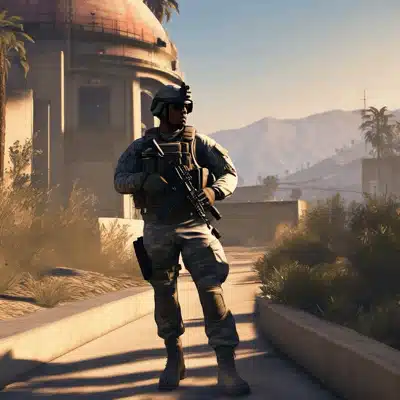How to Hire the Best Civilian Military Defense Lawyers
When your career, reputation, freedom, or retirement are on the line, hiring the right civilian military defense lawyer is one of the most important decisions you’ll ever make. Unlike appointed military counsel, civilian defense attorneys operate outside the chain of command and can devote 100% of their energy to defending you—aggressively, strategically, and without fear of command reprisal.
Gonzalez & Waddington, Attorneys at Law is one of the most experienced and respected civilian military defense firms in the world. Michael Waddington and Alexandra Gonzalez-Waddington have defended U.S. military personnel in some of the most complex and high-stakes cases of the past two decades—court-martials, war crimes, sexual assault allegations, classified intel breaches, and administrative actions across every branch of the military.
Whether you’re under investigation, pending court-martial, facing a separation board, or trying to preserve your clearance, retirement, or reputation—who you hire as your civilian lawyer matters.
What makes Gonzalez & Waddington a top-tier civilian military defense firm:
- ✅ Over 25 years of military defense experience in high-stakes trials, investigations, and administrative actions.
- ✅ Tried cases on 6 continents and at nearly every major U.S. military base worldwide.
- ✅ Defended clients in the Army, Navy, Air Force, Marines, Space Force, and Coast Guard.
- ✅ Published authors of legal books used by military lawyers on trial strategy and cross-examination.
- ✅ Frequently called to defend officers, special operators, senior NCOs, and high-profile combat cases.
- ✅ Known for aggressive, surgical courtroom strategy, especially in sex crime and classified cases.
Before you hire any civilian defense lawyer, ask them:
- How many contested courts-martial have you personally defended?
- Have you defended cases like mine, in my branch, and at my base?
- Can you travel to my location—and how often do you appear in court?
- What is your reputation among former clients, and what are your results?
How to Hire the Best Civilian Military Defense Lawyers – Frequently Asked Questions
What is the difference between a military lawyer and a civilian military defense lawyer?
 Military lawyers (JAGs) are uniformed attorneys assigned to your base and chain of command. Civilian military defense lawyers are independent, private attorneys you hire to represent you aggressively without command pressure. They typically have more courtroom experience and can devote more time to your defense.
Military lawyers (JAGs) are uniformed attorneys assigned to your base and chain of command. Civilian military defense lawyers are independent, private attorneys you hire to represent you aggressively without command pressure. They typically have more courtroom experience and can devote more time to your defense.
Can a civilian lawyer defend me in a military court-martial?
Yes. Civilian defense lawyers are authorized to appear in military courts and administrative proceedings worldwide. In fact, many of the best court-martial outcomes come when a skilled civilian lawyer teams up with military counsel to fight the case aggressively.
How do I know if a civilian military lawyer is reputable?
Ask about their trial record, publications, peer recognition, global experience, and case history. A reputable lawyer should be transparent about their courtroom wins, the types of cases they handle, and whether they’ve defended clients in your branch and at your location.
Will Gonzalez & Waddington travel to my base?
Yes. We represent clients worldwide—from Fort Bragg, Pendleton, and Norfolk to Germany, Japan, Korea, Bahrain, Djibouti, and combat zone FOBs. We’ve defended service members on nearly every continent where the U.S. military operates.
Should I wait until I’m formally charged to hire a lawyer?
No. The earlier you hire a lawyer, the more options you have. Early intervention can change the course of an investigation or avoid formal charges altogether. Don’t wait for Article 32 or a board—retain counsel at the first sign of trouble.
What kinds of cases do civilian military defense lawyers handle?
Court-martial defense (sexual assault, drug use, war crimes, fraud), Article 15/NJP, administrative separation boards, GOMOR rebuttals, IG complaints, security clearance defense, Boards of Inquiry, and pre-charge investigations.
Contact Gonzalez & Waddington to speak with civilian defense lawyers trusted by elite warriors, special operators, and those who refuse to roll over when the military comes after them. We defend cases worldwide, and we fight to win.
As a military servicemember or family member, one of the most daunting concerns you may face is the possibility of being investigated or charged under the Uniform Code of Military Justice (UCMJ).
Whether you find yourself embroiled in allegations of misconduct, administrative separation, or facing the uncertainty of a court-martial, hiring a competent civilian military defense lawyer is critical to protecting your career, reputation, and personal freedom. In this guide, we’ll explore the essential steps to help you select the best defense attorney who understands the unique challenges of military law.
Why Having the Right Military Defense Lawyer Matters
Navigating the complexities of military law is vastly different from civilian legal matters. In fact, statistics show that military personnel are at a higher risk of facing UCMJ charges compared to civilian counterparts. A poor legal defense can lead to severe consequences, including administrative separation, loss of career opportunities, and even jail time.
Common Concerns for Servicemembers
- Misunderstanding Legal Proceedings: Many servicemembers are unaware of the legal mechanisms and protections available to them.
- Fear of Retaliation: There’s often hesitation to consult a civilian lawyer due to concerns about the reaction of superiors.
- Navigating Charges: Charges under Article 120 (sexual assault), Article 134 (conduct unbecoming), and others can come with life-changing ramifications.
Steps to Hire the Best Civilian Military Defense Lawyers
1. Assess Your Needs
Before you begin searching for a lawyer, it’s important to identify your specific situation. Are you facing a court-martial for serious allegations, or are you dealing with administrative discipline? Understanding your needs can help narrow your search for the right legal representation.
Key Aspects to Consider:
- Type and seriousness of charges.
- Whether you require help with a GOMOR, NJP, Article 15, or a full court martial.
- The complexity of your case, such as potential threats to your military career.
2. Look for Specialized Experience
Not all lawyers are equipped to handle military law cases. When looking for a civilian defense lawyer, prioritize those who have significant experience in military law. Check if they have a background specifically in handling UCMJ cases, including procedures related to Captain’s Mast, administrative separation boards, and show cause boards.
Questions to Ask:
- How many military cases have you handled?
- What types of UCMJ charges do you specialize in?
- Have you represented clients before military courts?
3. Verify Credentials and Reputation
Research the credentials of potential civilian military defense lawyers. Look for:
- Bar admissions specific to military tribunals.
- Membership in organizations such as the National Association of Criminal Defense Lawyers (NACDL) or the American Bar Association’s Military Law section.
- Reviews and testimonials from former clients can offer insights into their reputation and success rate.
4. Consult for Compatibility
Schedule an initial consultation, which many military attorneys offer for free, to gauge the attorney’s approach to your case. A good attorney will not only provide legal guidance but also act as a supportive ally during a challenging time.
Assess Compatibility Based On:
- Communication style: Is the lawyer approachable and responsive?
- Understanding of military culture: Do they respect and comprehend the unique dynamics of military life?
- Overall demeanor: Do you feel comfortable discussing personal matters?
5. Discuss Fees and Financial Terms
Understanding the financial implications of hiring a civilian military defense lawyer is essential. Be transparent about costs and any potential additional fees. Some attorneys charge flat fees while others may work on an hourly basis.
Key Considerations Include:
- Is there a retainer fee to secure their services?
- Are payment plans available to accommodate financial constraints?
- Will the cost vary depending on the complexity of your case?
6. Trust Your Instincts
Finally, trust your gut. If something feels off during your consultation, it could be an indication of how the attorney approaches their clients. You should feel confident that the lawyer prioritizes your well-being and legal needs.
Frequently Asked Questions (FAQs)
What Should I Do if I’m Under Investigation?
If you’re under investigation, it’s crucial to:
- Remain silent until you can consult with a civilian military defense lawyer.
- Gather any evidence or documentation relevant to your case.
- Avoid discussing your case with anyone other than legal counsel.
How Can a Military Defense Lawyer Help Me?
A military defense lawyer can provide:
- Strategic legal advice throughout your case.
- Defense strategies tailored to your unique situation.
- Representation during all legal proceedings, including administrative hearings and court-martial.
What Are the Consequences of a UCMJ Charge?
Consequences can vary widely depending on the charge but may include:
- Reduction in rank.
- Loss of pay or benefits.
- Dishonorable discharge or even imprisonment in severe cases.
Conclusion
Facing legal issues in the military can feel isolating and overwhelming, but remember that you do not have to go through it alone. Finding the best civilian military defense lawyer can make a significant difference in the trajectory of your case. By assessing your needs, researching specialized expertise, confirming credentials, and trusting your instincts, you give yourself the best chance for a successful outcome.
If you or a loved one are facing legal issues in the military, contact Gonzalez & Waddington, Civilian Military Defense Lawyers, at 800-921-8607 for a free consultation. Our experienced team represents servicemembers worldwide, ready to fight for your rights and secure your future.
For more information about military justice, visit the U.S. Department of Defense’s Article 120 Resource page.
As you move forward, remember that having the right legal support can protect not only your military career but your life and reputation as well.



